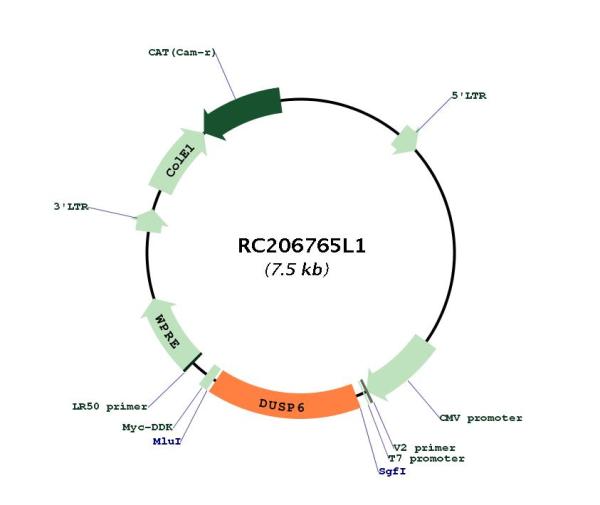DUSP6 (NM_001946) Human Tagged Lenti ORF Clone
CAT#: RC206765L1
- LentiORF®
Lenti ORF clone of Human dual specificity phosphatase 6 (DUSP6), transcript variant 1, Myc-DDK-tagged
"NM_001946" in other vectors (6)
Specifications
| Product Data | |
| Type | Human Tagged ORF Clone |
| Tag | Myc-DDK |
| Symbol | DUSP6 |
| Synonyms | HH19; MKP3; PYST1 |
| Vector | pLenti-C-Myc-DDK |
| E. coli Selection | Chloramphenicol (34 ug/mL) |
| Mammalian Cell Selection | None |
| Sequence Data |
The ORF insert of this clone is exactly the same as(RC206765).
|
| Restriction Sites |
SgfI-MluI
Cloning Scheme for this gene
Plasmid Map

|
| ACCN | NM_001946 |
| ORF Size | 1143 bp |
| OTI Disclaimer | Due to the inherent nature of this plasmid, standard methods to replicate additional amounts of DNA in E. coli are highly likely to result in mutations and/or rearrangements. Therefore, OriGene does not guarantee the capability to replicate this plasmid DNA. Additional amounts of DNA can be purchased from OriGene with batch-specific, full-sequence verification at a reduced cost. Please contact our customer care team at custsupport@origene.com or by calling 301.340.3188 option 3 for pricing and delivery. The molecular sequence of this clone aligns with the gene accession number as a point of reference only. However, individual transcript sequences of the same gene can differ through naturally occurring variations (e.g. polymorphisms), each with its own valid existence. This clone is substantially in agreement with the reference, but a complete review of all prevailing variants is recommended prior to use. More info |
| OTI Annotation | This clone was engineered to express the complete ORF with an expression tag. Expression varies depending on the nature of the gene. |
| Product Components | The ORF clone is ion-exchange column purified and shipped in a 2D barcoded Matrix tube containing 10ug of transfection-ready, dried plasmid DNA (reconstitute with 100 ul of water). |
| Reconstitution | 1. Centrifuge at 5,000xg for 5min. 2. Carefully open the tube and add 100ul of sterile water to dissolve the DNA. 3. Close the tube and incubate for 10 minutes at room temperature. 4. Briefly vortex the tube and then do a quick spin (less than 5000xg) to concentrate the liquid at the bottom. 5. Store the suspended plasmid at -20°C. The DNA is stable for at least one year from date of shipping when stored at -20°C. |
| Reference Data | |
| RefSeq | NM_001946.2 |
| RefSeq Size | 3395 bp |
| RefSeq ORF | 1146 bp |
| Locus ID | 1848 |
| UniProt ID | Q16828 |
| Cytogenetics | 12q21.33 |
| Domains | DSPc, RHOD |
| Protein Families | Druggable Genome, Phosphatase |
| Protein Pathways | MAPK signaling pathway |
| MW | 42.3 kDa |
| Gene Summary | The protein encoded by this gene is a member of the dual specificity protein phosphatase subfamily. These phosphatases inactivate their target kinases by dephosphorylating both the phosphoserine/threonine and phosphotyrosine residues. They negatively regulate members of the mitogen-activated protein (MAP) kinase superfamily (MAPK/ERK, SAPK/JNK, p38), which are associated with cellular proliferation and differentiation. Different members of the family of dual specificity phosphatases show distinct substrate specificities for various MAP kinases, different tissue distribution and subcellular localization, and different modes of inducibility of their expression by extracellular stimuli. This gene product inactivates ERK2, is expressed in a variety of tissues with the highest levels in heart and pancreas, and unlike most other members of this family, is localized in the cytoplasm. Mutations in this gene have been associated with congenital hypogonadotropic hypogonadism. Alternatively spliced transcript variants have been found for this gene. [provided by RefSeq, Jan 2014] |
Documents
| Product Manuals |
| FAQs |
| SDS |
Resources
Other Versions
| SKU | Description | Size | Price |
|---|---|---|---|
| RC206765 | DUSP6 (Myc-DDK-tagged)-Human dual specificity phosphatase 6 (DUSP6), transcript variant 1 |
USD 686.00 |
|
| RC206765L2 | Lenti ORF clone of Human dual specificity phosphatase 6 (DUSP6), transcript variant 1, mGFP tagged |
USD 986.00 |
|
| RC206765L3 | Lenti ORF clone of Human dual specificity phosphatase 6 (DUSP6), transcript variant 1, Myc-DDK-tagged |
USD 986.00 |
|
| RC206765L4 | Lenti ORF clone of Human dual specificity phosphatase 6 (DUSP6), transcript variant 1, mGFP tagged |
USD 986.00 |
|
| RG206765 | DUSP6 (tGFP-tagged) - Human dual specificity phosphatase 6 (DUSP6), transcript variant 1 |
USD 886.00 |
|
| SC321781 | DUSP6 (untagged)-Human dual specificity phosphatase 6 (DUSP6), transcript variant 1 |
USD 686.00 |
{0} Product Review(s)
Be the first one to submit a review






























































































































































































































































 Germany
Germany
 Japan
Japan
 United Kingdom
United Kingdom
 China
China



